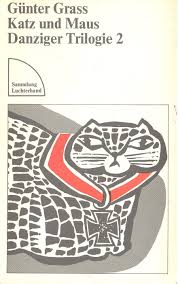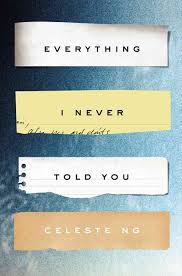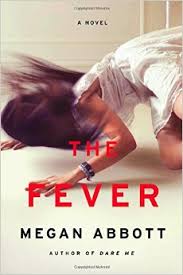Having now read all six novels on this year’s Clarke Award shortlist, and with just two weeks to go before the award ceremony itself, I thought I’d try and bring some order to my thoughts on the books in contention. What’s interested me most about this year’s shortlist is the almost overwhelmingly positive reception it has received. People like this shortlist – I don’t think I’ve seen a single dissenting opinion or online rant (yet – it could be that people have been too preoccupied with Puppygate), which must be a first in itself. So what is it about this list that sets it apart?
I think the word that sprang to mind first for me as an adjective to describe this list was cohesive. In a way that few of the more recent shortlists have done, the 2015 Arthur C. Clarke Award shortlist seems to present a unified vision, a statement of intent: here is a snapshot of science fiction in 2015, make of it what you will. It also has an air of balance about it. Gender parity, for a start, also an interesting mix of novels from both genre and mainstream literary publishers. (Niall Harrison has more to say about this in his characteristically excellent and fair-minded write-up at Strange Horizons.) There is a sense that books on this list really could reach across the genre/mainstream divide and win new readers for science fiction. Several of the titles – The Girl with all the Gifts and Station Eleven in particular – have already enjoyed considerable commercial success.
So this list is popular, balanced, cohesive, appealing and commercial. It showcases a science fiction that is inclusive and gregarious, a literature that is lively and engaged. What could possibly be wrong? Well, nothing, and I’m not going to be the Jeremiah who steps forward to proclaim this a baaaad shortlist (oh Jeremiah, where are you when I need you?) But even as the six books were unveiled, I couldn’t help feeling that the Clarke Award shortlist 2015 could just as easily be defined by the books that don’t appear on it as by those that do. 2014 was – and I think we’re all agreed on this – an exceptional year for science fiction. The judges could easily have picked four or five completely different and equally acceptable shortlists from the books on offer. I do find I have to ask myself: why this one?
For me, this is a shortlist of two halves. On the one hand we have Europe in Autumn, The First Fifteen Lives of Harry August, and Station Eleven. I like and admire all three of these books, for various reasons, and I think any of them could make a worthy winner. On the other hand we have The Girl with all the Gifts, Memory of Water, and The Book of Strange New Things, all books I dislike, somewhat vehemently, for equally differing reasons. But once again it’s interesting to note how little distance, in terms of tone, ambition and execution, there is between them really.
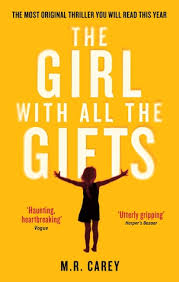 I know a lot of readers have loved M. R. Carey’s The Girl with all the Gifts, and I can understand why. This is a zombie story with a difference – a zombie point of view, in fact – and unlike some authors of the slash ’em and burn ’em school, Carey has taken care not only to provide us with a story that is rooted in character but that also comes complete with a convincing scientific rationale for his zombie apocalypse. I get that, but I hated it anyway. Not only did the semi-intriguing opening act rapidly give way to your typical small-band-of-survivors-make-their-way-through-the-zombie-infested-wastes-exploring-their-cliched-and-ultimately-irrelevant-backstories-as-they-go kind of book (and why did the junkers swamp the army base with zombies in the first place? Because the plot needed them to, that’s why), but I later discovered that the part of the book I admired most – the carefully detailed scientific explanation behind the zombie plague – had actually been explored before, via a multi-million-selling computer game. A lot of digital ink has been spilled over the sensitivity of the writing in The Girl with all the Gifts, but although I found it perfectly serviceable for the most part, the too-frequent intrusion of embarrassingly clunky and overworked metaphors really wasn’t a plus, to say the least. The characters, with the possible exception of Melanie herself, are blandly plot-bound. The Girl with all the Gifts is a highly readable, skilfully executed piece of commercial genre fiction – just the thing for a long train ride, and that ending is unexpected. But given what the judges had to choose from, I honestly have no idea how or indeed why it ended up on the shortlist for an award charged with finding the best SF novel of the year.
I know a lot of readers have loved M. R. Carey’s The Girl with all the Gifts, and I can understand why. This is a zombie story with a difference – a zombie point of view, in fact – and unlike some authors of the slash ’em and burn ’em school, Carey has taken care not only to provide us with a story that is rooted in character but that also comes complete with a convincing scientific rationale for his zombie apocalypse. I get that, but I hated it anyway. Not only did the semi-intriguing opening act rapidly give way to your typical small-band-of-survivors-make-their-way-through-the-zombie-infested-wastes-exploring-their-cliched-and-ultimately-irrelevant-backstories-as-they-go kind of book (and why did the junkers swamp the army base with zombies in the first place? Because the plot needed them to, that’s why), but I later discovered that the part of the book I admired most – the carefully detailed scientific explanation behind the zombie plague – had actually been explored before, via a multi-million-selling computer game. A lot of digital ink has been spilled over the sensitivity of the writing in The Girl with all the Gifts, but although I found it perfectly serviceable for the most part, the too-frequent intrusion of embarrassingly clunky and overworked metaphors really wasn’t a plus, to say the least. The characters, with the possible exception of Melanie herself, are blandly plot-bound. The Girl with all the Gifts is a highly readable, skilfully executed piece of commercial genre fiction – just the thing for a long train ride, and that ending is unexpected. But given what the judges had to choose from, I honestly have no idea how or indeed why it ended up on the shortlist for an award charged with finding the best SF novel of the year.
I reviewed Memory of Water for Arc magazine, so there’s no need for me to 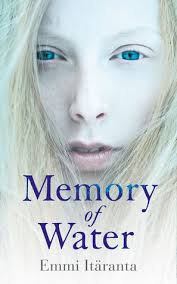 go over old ground by explaining why this novel didn’t work for me. Again, other readers have loved it – for an opposite view to my own, please do seek out Katherine Farmar’s review at Strange Horizons – and Itaranta is clearly a thoughtful and painstaking writer with her heart in the right place. I am genuinely interested to see what she does next – but for me, Memory of Water still only makes sense for me as YA, the kind of book I know I would have enjoyed as a younger reader but that feels tentative, unformed and insipid to me now, and with no clear direction.
go over old ground by explaining why this novel didn’t work for me. Again, other readers have loved it – for an opposite view to my own, please do seek out Katherine Farmar’s review at Strange Horizons – and Itaranta is clearly a thoughtful and painstaking writer with her heart in the right place. I am genuinely interested to see what she does next – but for me, Memory of Water still only makes sense for me as YA, the kind of book I know I would have enjoyed as a younger reader but that feels tentative, unformed and insipid to me now, and with no clear direction.
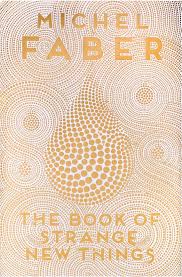 The Michel Faber. Well, I think I voiced my feelings about that one clearly enough in my review at Strange Horizons! Safe to say I wasn’t keen. The thing is and for all my personal dislike of it, I’m finding myself respecting the judges’ choice of this book more, because for all its faults and failings (of which there are many) The Book of Strange New Things is so clearly an ambitious attempt to do something (though I’m still not clear what) by a writer I’ve loved in the past and hope to see a lot more of in the future (Faber’s moratorium on novels for the time being does not, we would hope, extend to short fiction). You never know what you’re going to get with Faber, which is part of the joy of him. He keeps pushing himself, which is what all writers should do. And I’m intrigued and provoked by the fact that the judges took this (impossible white elephant of a) book to their hearts and thence to the shortlist.
The Michel Faber. Well, I think I voiced my feelings about that one clearly enough in my review at Strange Horizons! Safe to say I wasn’t keen. The thing is and for all my personal dislike of it, I’m finding myself respecting the judges’ choice of this book more, because for all its faults and failings (of which there are many) The Book of Strange New Things is so clearly an ambitious attempt to do something (though I’m still not clear what) by a writer I’ve loved in the past and hope to see a lot more of in the future (Faber’s moratorium on novels for the time being does not, we would hope, extend to short fiction). You never know what you’re going to get with Faber, which is part of the joy of him. He keeps pushing himself, which is what all writers should do. And I’m intrigued and provoked by the fact that the judges took this (impossible white elephant of a) book to their hearts and thence to the shortlist.
Like The Girl with all the Gifts, The First Fifteen Lives of Harry August presents us 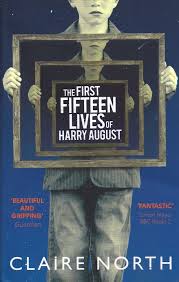 with a skilfully written, commercially successful slice of pure genre. But oh, did I prefer Harry August. This novel is narrated entirely from the eponymous Harry’s point of view, so whether or not you’re going to like it will depend at least in part on how well you get on with him. I loved Harry’s knowing style, his death-black humour, his ironical wit. I also loved the way the book extrapolates the grandfather paradox to its logical conclusion, the expertly woven plot threads and time streams, the novel’s overall cohesion. As I was reading, I kept thinking (not without some sorrow) that Harry August is exactly what Doctor Who could and should be like, if only the people in charge of that particular juggernaut had the balls to commission and produce some decent science fiction stories instead of the timey-handwavy claptrap they continue to foist upon us. Harry August is smart, well-made, and – in spite of the slew of ‘repeated lives’ novels we’ve been seeing recently – original. If i have a criticism, it is that the book drags in the third quarter. Overall it is about a hundred pages too long. Some judicious cutting of repeated information would have improved the pace of the story no end.
with a skilfully written, commercially successful slice of pure genre. But oh, did I prefer Harry August. This novel is narrated entirely from the eponymous Harry’s point of view, so whether or not you’re going to like it will depend at least in part on how well you get on with him. I loved Harry’s knowing style, his death-black humour, his ironical wit. I also loved the way the book extrapolates the grandfather paradox to its logical conclusion, the expertly woven plot threads and time streams, the novel’s overall cohesion. As I was reading, I kept thinking (not without some sorrow) that Harry August is exactly what Doctor Who could and should be like, if only the people in charge of that particular juggernaut had the balls to commission and produce some decent science fiction stories instead of the timey-handwavy claptrap they continue to foist upon us. Harry August is smart, well-made, and – in spite of the slew of ‘repeated lives’ novels we’ve been seeing recently – original. If i have a criticism, it is that the book drags in the third quarter. Overall it is about a hundred pages too long. Some judicious cutting of repeated information would have improved the pace of the story no end.
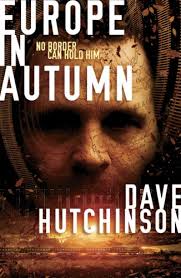 With its wit, irony and black humour, Europe in Autumn shares many positive traits in common with Harry August, and in overall tone and general smartness of attitude, these two novels reminded me of each other quite a lot. I loved Rudi’s glum stoicism as I loved Harry’s arch ironies. I similarly enjoyed the wonderfully evoked post-Soviet ambience and the central conceit – parallel Europes this time, and with a secret map to boot. If Europe in Autumn has the edge over Harry August for me it’s because it’s just a little rougher around the edges, a little less slick, a little less calculated. I actively enjoyed the way the novel wanders, in seemingly unconnected segments, over the continent. In contrast with some readers, I had no problem with the lateness of the reveal. There was plenty to keep me happy along the way, and the central premise, when it finally becomes clear, is well worth waiting for. This is British science fiction of a kind – cerebral, funny, eccentric and vaguely glum – we need more of. I like this book. A lot.
With its wit, irony and black humour, Europe in Autumn shares many positive traits in common with Harry August, and in overall tone and general smartness of attitude, these two novels reminded me of each other quite a lot. I loved Rudi’s glum stoicism as I loved Harry’s arch ironies. I similarly enjoyed the wonderfully evoked post-Soviet ambience and the central conceit – parallel Europes this time, and with a secret map to boot. If Europe in Autumn has the edge over Harry August for me it’s because it’s just a little rougher around the edges, a little less slick, a little less calculated. I actively enjoyed the way the novel wanders, in seemingly unconnected segments, over the continent. In contrast with some readers, I had no problem with the lateness of the reveal. There was plenty to keep me happy along the way, and the central premise, when it finally becomes clear, is well worth waiting for. This is British science fiction of a kind – cerebral, funny, eccentric and vaguely glum – we need more of. I like this book. A lot.
Of all the novels on this year’s Clarke shortlist, Station Eleven is, for me, the 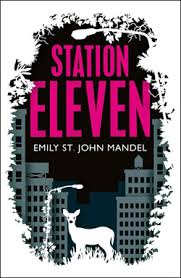 most complete and satisfying as a work of literature. The story as such is pretty conventional in terms of its science fiction: superflu pandemic escapes from a medical laboratory somewhere in Europe, 99% of the world’s population dies, the survivors struggle to make a new world amongst the ruins. So far, so yawn-inducing. (In fact when I describe it like that, I almost begin to hate it myself.) Where Station Eleven finds its strength though is in the depiction of the inner lives and minor struggles of the central cast of characters in the years before the final catastrophe. The characterisation, the interweaving web of people and circumstance, is so finely, so expertly wrought that it arguably makes Station Eleven, of all the books on this shortlist, the novel that would most reward a rereading. It’s a beautiful book, and largely deserving of the critical attention it has received. If there’s a but, in terms of its Clarke nomination at least, it has to be centred around the business of its science fiction. Even as someone who rates this novel, I am bound to admit there’s nothing particularly new here. For a more robust discussion of the pro and contra of Station Eleven, you should check out the heartfelt disagreement between Kirstyn McDermott and Ian Mond at The Writer and the Critic. Great listening.
most complete and satisfying as a work of literature. The story as such is pretty conventional in terms of its science fiction: superflu pandemic escapes from a medical laboratory somewhere in Europe, 99% of the world’s population dies, the survivors struggle to make a new world amongst the ruins. So far, so yawn-inducing. (In fact when I describe it like that, I almost begin to hate it myself.) Where Station Eleven finds its strength though is in the depiction of the inner lives and minor struggles of the central cast of characters in the years before the final catastrophe. The characterisation, the interweaving web of people and circumstance, is so finely, so expertly wrought that it arguably makes Station Eleven, of all the books on this shortlist, the novel that would most reward a rereading. It’s a beautiful book, and largely deserving of the critical attention it has received. If there’s a but, in terms of its Clarke nomination at least, it has to be centred around the business of its science fiction. Even as someone who rates this novel, I am bound to admit there’s nothing particularly new here. For a more robust discussion of the pro and contra of Station Eleven, you should check out the heartfelt disagreement between Kirstyn McDermott and Ian Mond at The Writer and the Critic. Great listening.
So that’s the shortlist we’ve got. But what of the shortlist we could have had? For my money, the most incomprehensible omission from this and from other awards shortlists this year has been Jeff VanderMeer’s Annihilation. Even leaving aside the business of whether the Southern Reach trilogy could or should have been considered as a single work (and I for one believe that VanderMeer’s awards chances have been compromised by confusion over this very point), Annihilation is, by itself, one of the most significant SFF novels of 2014 and the idea that The Girl with all the Gifts, say, could have been prioritised over it provokes, in me at least, a moment of genuine ‘whaaafuuu??’
And what of Monica Byrne? Even if I felt a little disappointed that the masterful worldbuilding and original science fictional concepts that so beautifully characterise the ambience of The Girl in the Road were not foregrounded a little more in the novel’s plot development, there isn’t a smidgen of doubt in my mind that Byrne’s debut is an exceptional work of literature. Even where there are vague conceptual similarities – both books present visions of a near future – The Girl in the Road‘s use of language, breadth and depth of vision, daringness in terms of ideas, its sense of direction and overall cohesiveness all set it on a different plane entirely when set alongside Memory of Water, say. Another ‘whaaafuuu???’ moment for me, then, not to mention the sense of a missed opportunity: just imagine, for a moment, a shortlist that swapped Carey and Itaranta for VanderMeer and Byrne.
Personally I’d go one further and swap an old hand for a new kid – Michel Faber for Hanya Yanagihara, if we want to name names (and yes, of course we do). If I had to sum up The Book of Strange New Things in a single phrase, I would describe it as a wonderful idea that went woefully awry. The People in the Trees, on the other hand, is a debut so strong it’s difficult to believe that it is a debut. The science fictional conceit – a tribe of people who have inadvertently discovered the secret of eternal life – runs like a silver thread through this novel, which foregrounds subjects key to contemporary near-future science fiction such as aggressive colonisation, environmental degradation and the exploitation of indigenous societies to meet Western needs. Yanagihara’s narrator is one of the most loathsome and compelling voices I have encountered in literature recently, brilliantly realised, and the somewhat Nabokovian introduction and footnotes by a ‘frame narrator’ were just the icing on the cake for me. In sum, the inclusion of Yanagihara would have made for an edgier, more propulsive feel to the shortlist that would have been most welcome.
In fact, if I were to define what it is, precisely, that feels absent from this year’s Clarke shortlist it would be that sense of edginess, of risk. Taken as a whole, the six books we have make up a solid group that no one, least of all the judges, should feel ashamed of. But that’s the word, isn’t it? Solid. Am I alone in feeling I’m missing the raw edges of Simon Ings’s Wolves, the wild speculation of Adam Roberts’s Bete, the uneasy post-colonial meditations of Nick Harkaway’s Tigerman, the antic anger of Lavie Tidhar’s A Man Lies Dreaming, the linguistic panache of Sandra Newman’s The Country of Ice Cream Star, the manic experimentalism of Nnedi Okorafor’s Lagoon? Aside from the minor narrative discontinuities of Europe in Autumn and the alternation between present day and flashback sequences in Station Eleven, we have nothing on the shortlist-as-is that so much as hints at formal experiment, or challenges us in terms of language, or discomfits our sense of what science fiction might be for.
It all feels a bit safe to me, in terms of both audience expectations and market demands. And the last thing science fiction needs is to be safe. It should be radical and it should be provocative. I think we’ve missed a trick here, and that is a shame.
My vote for May 6th, for what it’s worth, goes to Europe in Autumn, easily the most subversive book on the list and all the more rewarding for those tricky sharp bits.
